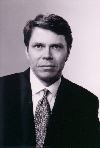Don Boudreaux on Law and Legislation
Dec 11 2006 Don Boudreaux of George Mason University talks about the fundamental principles of economics and civilization: spontaneous order and law. Drawing on volume one of Friedrich Hayek's classic, Law, Legislation and Liberty, Boudreaux talks about the distinction between law and legislation, the appropriate role of judges, and how the fulfillment of our expectations allows us to pursue our goals and dreams.
Don Boudreaux of George Mason University talks about the fundamental principles of economics and civilization: spontaneous order and law. Drawing on volume one of Friedrich Hayek's classic, Law, Legislation and Liberty, Boudreaux talks about the distinction between law and legislation, the appropriate role of judges, and how the fulfillment of our expectations allows us to pursue our goals and dreams.
-
- Afterthought on the above conversation with Don Boudreaux: How difficult is it to keep up with the bewildering array of legislation? Here's a quote by
-
- from an Oct. 1974 speech he gave to the business community:
-
- "... The number of laws is so great that I doubt that there is a man in this room, myself included, who could not be sent to prison if there were a sufficiently determined attempt by prosecutors to do it. There are laws we have all broken, not because we are not law-abiding, but because there are so many laws and so many that we don't know about."
-

READER COMMENTS
Peter
Feb 4 2007 at 11:51am
I really enjoyed the podcast (although I found myself constantly rewinding my ipod to understand a lot of the thoughts). I am writing with a half smile because I was amazed when Don raised the example of cafeteria. To this day I think it is the height of selfish for people to ‘jump the line’ in such fashion; do people that employ that tactic of reserving a seat feel that they are more deserving of a seat than the peron ahead of them in line or that the person ahead of them was too stupid to think of it. You were both correct in your portrayl that there is such an expectation but I was disappointed in your subtle endorsement. (I know it is kind of silly but I do see it as an example of our rampant self-interest). Also, I am not sure a jury would rule in your favor ie. if they were like me…haha. Keep up the good work.
Comments are closed.